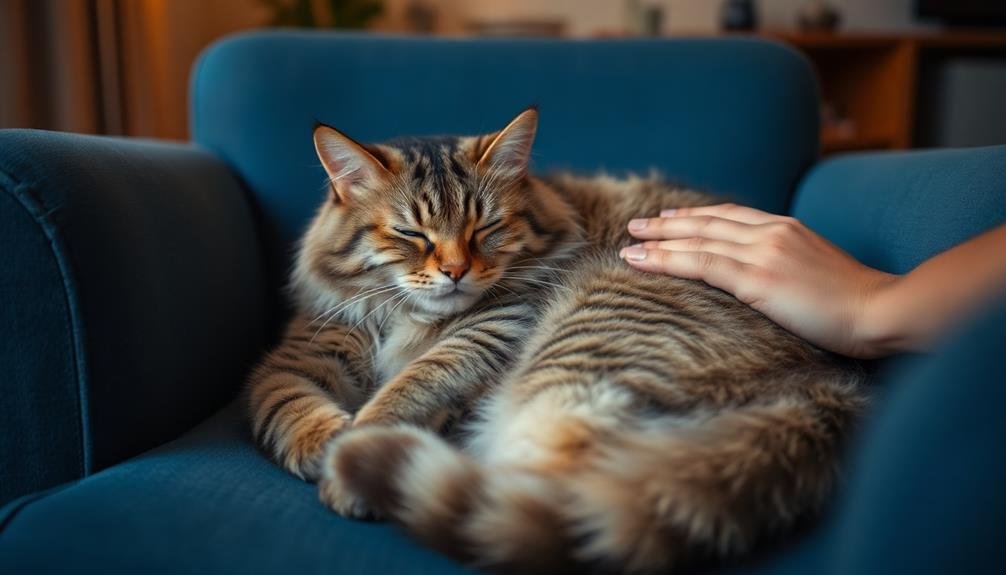Cat purrs offer you a natural, effective way to reduce stress and worry through their unique therapeutic properties. They lower your blood pressure, release endorphins, and promote relaxation and calmness. You'll find improved sleep quality and reduced cortisol levels when exposed to purring. The soothing vibrations enhance your emotional well-being and boost your immune system function. By spending time with a purring cat, you're tapping into a powerful stress-reduction tool that works on multiple levels – physical, emotional, and psychological. Discover how these seven benefits of cat purrs can transform your daily life and overall well-being.
Lowering Blood Pressure

Through the gentle vibrations of a cat's purr, your blood pressure can considerably decrease. When you're stressed, your blood pressure often rises, putting strain on your cardiovascular system. However, the soothing sound and feel of a cat's purr can help counteract this effect.
The frequency of a cat's purr, typically between 25 and 150 Hz, has been shown to have therapeutic effects on the human body. As you sit with a purring cat, these vibrations can slow your heart rate and relax your blood vessels, leading to a natural reduction in blood pressure.
You'll often notice that petting a purring cat feels calming. This isn't just in your head – it's a physiological response. The rhythmic sound and vibration act as a form of sound therapy, encouraging your body to release stress-reducing hormones like oxytocin and serotonin.
Regular exposure to a cat's purr can have long-term benefits for your cardiovascular health. By incorporating time with a purring cat into your daily routine, you're not just enjoying companionship – you're actively supporting your heart health and managing stress levels.
Releasing Endorphins
When you listen to your cat's purr, your brain releases endorphins, providing natural pain relief and boosting your mood.
These feel-good chemicals act as your body's own stress-busting agents, helping to reduce tension and anxiety.
As endorphin levels rise, you'll notice a decrease in stress hormones, further contributing to an overall sense of calm and well-being.
Natural Pain Relief
A fascinating aspect of cat purrs is their potential to act as a natural pain reliever. When you're experiencing discomfort, spending time with a purring cat might offer more than just emotional comfort. The vibrations produced by a cat's purr fall within a frequency range of 20-140 Hz, which has been shown to have therapeutic effects on the human body.
These vibrations can help alleviate various types of pain, including:
| Pain Type | Effect of Purring | Duration for Relief |
|---|---|---|
| Joint Pain | Reduces inflammation | 15-20 minutes |
| Muscle Soreness | Promotes healing | 10-15 minutes |
| Headaches | Eases tension | 5-10 minutes |
| Chronic Pain | Increases endorphins | 20-30 minutes |
You'll find that regular exposure to cat purrs can complement your existing pain management strategies. The non-invasive nature of this therapy makes it an attractive option for those seeking alternative pain relief methods. While it's not a substitute for medical treatment, incorporating purr therapy into your routine can provide a gentle, natural way to manage pain and improve your overall well-being.
Mood-Boosting Effects
Happiness blooms when you're in the presence of a purring cat. The soothing vibrations of a feline's purr can trigger the release of endorphins in your brain, nature's own mood-boosting chemicals. These feel-good hormones help alleviate stress, anxiety, and even symptoms of depression.
When you stroke a purring cat, you're not just comforting the animal; you're also activating your body's natural stress-relief system. The rhythmic sound and vibration of the purr can lower your heart rate and blood pressure, inducing a state of calm and relaxation.
This interaction stimulates the production of oxytocin, often called the "love hormone," which promotes feelings of bonding and well-being.
The mood-elevating effects of a cat's purr aren't limited to direct physical contact. Even listening to recorded purrs can have a positive impact on your emotional state.
It's a form of sound therapy that can help you unwind after a long day or provide a soothing backdrop for meditation or sleep. By incorporating purr therapy into your daily routine, you're tapping into a natural, drug-free way to boost your mood and overall mental health.
Stress Hormone Reduction
Cat purrs do more than just elevate your mood; they actively combat stress hormones in your body. When you're exposed to the soothing vibrations of a cat's purr, your body responds by reducing the production of cortisol, the primary stress hormone. This decrease in cortisol levels helps you feel more relaxed and less anxious.
The frequency of a cat's purr, typically between 20-140 Hz, has been shown to stimulate the release of endorphins in your brain. These natural pain-relievers and mood-enhancers counteract the effects of stress hormones, promoting a sense of well-being. As you listen to and feel the purring, your body's endorphin production increases, creating a natural high that can help alleviate stress and anxiety.
Moreover, the rhythmic sound of purring can lower your blood pressure and heart rate, further reducing the physical manifestations of stress. This physiological response is similar to the effects of meditation or deep breathing exercises.
Promoting Relaxation and Calmness

You'll find that a cat's purr can be incredibly soothing, with its gentle vibrations inducing a sense of calm throughout your body.
As you listen to and feel these rhythmic sounds, you're likely to experience a noticeable reduction in stress and anxiety.
Additionally, the act of petting a purring cat can lower your blood pressure, further contributing to an overall state of relaxation and tranquility.
Soothing Vibrations Induce Calm
The soothing vibrations of a cat's purr can induce a state of calm in humans. When you're near a purring cat, you'll feel gentle vibrations that resonate at frequencies between 25 and 150 Hz. These frequencies have been shown to have therapeutic effects on your body and mind.
As you listen to and feel a cat's purr, your brain starts to produce more alpha waves, which are associated with relaxation and meditation. This shift in brainwave activity can help reduce your stress levels and promote a sense of tranquility.
The rhythmic nature of the purr also acts as a natural form of white noise, blocking out distracting sounds and helping you focus on the present moment.
Moreover, the vibrations from a cat's purr can stimulate the release of endorphins in your body. These natural feel-good chemicals can elevate your mood and decrease feelings of anxiety.
The physical sensation of the purr vibrations can also help relax tense muscles, especially when a cat is resting on your chest or lap. This combination of auditory and tactile stimulation creates a multi-sensory experience that effectively induces calm and reduces stress.
Purrs Lower Blood Pressure
Tranquility extends beyond mental calmness when you're exposed to a cat's purr. Research has shown that the rhythmic vibrations of a cat's purr can actually lower your blood pressure. This physiological response is linked to the frequency range of cat purrs, typically between 20 and 140 Hz, which has been found to have therapeutic effects on the human body.
When you spend time with a purring cat, you're likely to experience a gradual decrease in your blood pressure. This effect is particularly beneficial if you're dealing with hypertension or stress-related cardiovascular issues. The steady, low-frequency sound waves emitted during purring can help relax your blood vessels, reducing tension and promoting better circulation.
You don't even need to be in direct contact with the cat to reap these benefits. Simply being in the same room and hearing the purr can trigger this positive physiological response.
Improving Sleep Quality
While many struggle with sleep issues, a cat's purr can be a surprisingly effective remedy for improving sleep quality. The gentle vibrations and rhythmic sound of a cat's purr can help lull you into a peaceful slumber. When you're trying to fall asleep, having a purring cat nearby can create a calming atmosphere that eases your mind and relaxes your body.
The soothing effects of a cat's purr on sleep quality include:
- Reducing anxiety and racing thoughts
- Promoting relaxation and mindfulness
- Creating a consistent, white noise-like sound
- Encouraging slower, deeper breathing
- Releasing oxytocin, the "feel-good" hormone
You'll find that incorporating your cat's purring into your bedtime routine can lead to more restful nights. The comforting presence of your feline friend, combined with their natural ability to purr, can help you achieve a deeper, more restorative sleep.
Reducing Cortisol Levels

Stress-busting purrs can greatly impact your body's cortisol levels. When you're around a purring cat, your body's stress response begins to calm down. Cortisol, often called the "stress hormone," tends to decrease as you listen to the soothing vibrations of a cat's purr.
The frequency of a cat's purr, typically between 20-140 Hz, has been shown to have therapeutic effects on the human body. This includes lowering cortisol levels, which can help reduce feelings of anxiety and tension. As your cortisol levels drop, you'll likely feel more relaxed and at ease.
Spending time with a purring cat can create a positive feedback loop. As your stress decreases and cortisol levels fall, you'll feel more inclined to continue the interaction. This prolonged exposure to purring can lead to sustained reductions in cortisol, potentially improving your overall stress management.
To maximize these benefits, try spending quality time with a purring cat daily. Even short sessions can help regulate your cortisol levels and contribute to a more balanced stress response over time.
Enhancing Emotional Well-being
Beyond its physiological effects, a cat's purr can greatly boost your emotional well-being. When you're feeling down or anxious, spending time with a purring cat can provide comfort and companionship. The rhythmic sound and vibration of a purr can create a sense of calm and contentment, helping you feel more grounded and relaxed.
Interacting with a purring cat can also trigger the release of oxytocin, often called the "love hormone," which promotes feelings of bonding and happiness. This can help alleviate symptoms of depression and loneliness, improving your overall mood and outlook on life.
Here are some ways a cat's purr can enhance your emotional well-being:
- Provides a sense of unconditional love and acceptance
- Offers a calming distraction from worries and negative thoughts
- Encourages mindfulness and living in the present moment
- Boosts self-esteem through the cat's affection and dependence
- Creates a positive association with relaxation and comfort
Boosting Immune System Function

You might be surprised to learn that a cat's purr can actually help boost your immune system. The soothing vibrations produced by a purring cat can stimulate the production of certain hormones and chemicals in your body that strengthen your immune response.
When you're exposed to the frequency of a cat's purr, typically between 20-140 Hz, it can increase the production of cytokines. These proteins play a significant role in regulating your immune system and fighting off infections.
Moreover, the stress-reducing effects of a cat's purr indirectly support immune function by lowering cortisol levels, which can suppress immune activity when elevated.
The vibrations from a purring cat can also promote the production of natural killer cells, a type of white blood cell that helps defend against viruses and cancer cells.
In addition, these vibrations may stimulate the lymphatic system, aiding in the removal of toxins and waste products from your body.
Frequently Asked Questions
Can Cats Purr on Command or Be Trained to Purr?
You can't train cats to purr on command. They purr naturally when content or seeking comfort. However, you can encourage purring by creating a relaxing environment and engaging in activities they enjoy, like petting or grooming.
Do All Cat Breeds Purr With the Same Frequency and Intensity?
No, cat breeds don't all purr the same way. You'll notice differences in frequency and intensity among breeds. Some purr louder, while others have a softer purr. It's part of what makes each cat unique.
How Long Should One Listen to Cat Purrs for Optimal Stress Relief?
You'll find ideal stress relief by listening to cat purrs for about 15-20 minutes. It's enough time to calm your nervous system without overstimulation. Remember, everyone's different, so adjust the duration based on your personal response.
Are There Any Negative Effects of Prolonged Exposure to Cat Purrs?
You shouldn't worry about negative effects from prolonged exposure to cat purrs. They're generally safe and soothing. However, if you're allergic to cats, you might experience symptoms. It's best to consult your doctor if concerned.
Can Recorded Cat Purrs Provide the Same Stress-Reducing Benefits as Live Purring?
While recorded cat purrs can offer some stress-reducing benefits, they're not as effective as live purring. You'll miss out on the physical presence and vibrations of a real cat, which contribute greatly to the calming effect you experience.
In Summary
You've discovered the incredible power of your cat's purr to reduce stress and improve your well-being. From lowering your blood pressure to boosting your immune system, these vibrations are nature's remedy for a worried mind. Next time you're feeling overwhelmed, cuddle up with your feline friend and let their soothing purrs work their magic. You'll be amazed at how quickly you'll feel calmer, happier, and more relaxed. Embrace the healing power of purrs!





Leave a Reply